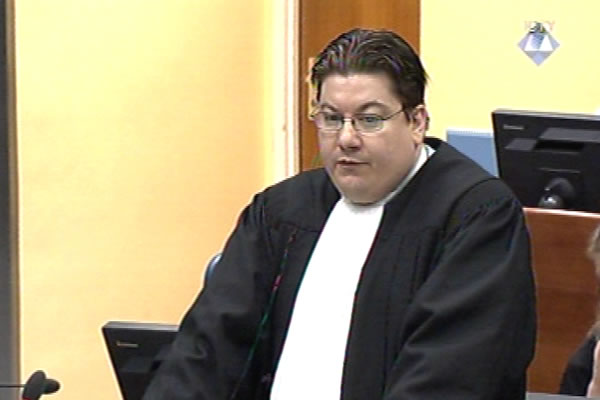Home
DEFENSE: ‘IRRECONCILABLE DIFFERENCES’ BETWEEN MLADIC AND KARADZIC
In the final part of the Rule 98bis hearing, the defense of the former commander of the VRS Main Staff argued there was ‘clear evidence of irreconcilable differences’ between Ratko Mladic and Radovan Karadzic. Countering the argument, the prosecution insisted that the ‘professional relationship between Karadzic and Mladic functioned well’. Their occasional differences didn’t affect their participation in the joint criminal enterprise or their ‘superior-subordinate’ relationship, the prosecution claimed
 Dragan Ivetic, defence attorney of Ratko Mladic
Dragan Ivetic, defence attorney of Ratko Mladic The Rule 98bis hearing ended today at Ratko Mladic's trial. The rule allows the accused to ask for acquittal after the prosecution has rested its case on the counts in the indictment for which, in their view, the prosecution has failed to call sufficient evidence that could, if uncontested, lead to a conviction. In its response to the prosecution’s arguments presented yesterday, the defense repeated the argument that Ratko Mladic ‘never intended or ordered any crimes, because he had at all times acted honorably to defend his nation and his country during the conflict’. According to defense counsel Dragan Ivetic, both the defense and Ratko Mladic ‘feel for all the bereaved’.
The defense argued that during its case the prosecution ‘hasn’t called evidence showing that Mladic was informed about the crimes’. Whenever he learned about crimes, the defense argued, Mladic issued orders to disarm, punish and prosecute the perpetrators. The prosecution’s interpretation of the events, that the transfers of people from one place to another was an organized campaign of ethnic cleansing, ‘did not take into account the whole context’, the defense said.
Presiding judge Alfons Orie followed up on Ivetic’s repeated claims that Mladic never issued a single unlawful order, and told Iveticto give the judges his interpretation of the order of 28 May 1992 . Mladic ordered his troopsto shell Pofalici ‘because there aren’t many Serbs there’ and to ‘roll out the minds’ of the people in Sarajevo. The defense contested the authenticity of the recording, but argued just in case that the order was ‘taken out of context’. After consulting with the accused,Ivetic offered a new, original explanation of the order: Mladic worried that the BH Army might ‘take revenge’ on the Serb civilians and therefore ordered the shelling of an area where there weren’t many of them.
Ivetic went on to speak about the relationship between Karadzic and Mladic. According to the defense, the prosecution hasn’t been able to explain ‘how there could be any agreed and coordinated action of the purported members of the joint criminal enterprise’ given the ‘clear evidence about the irreconcilable differences’ between Mladic and Karadzic. The ‘clear evidence’ includes Karadzic’s attempt to remove Mladic from the post of theMain Staff commander, their disagreements over the use of Arkan and other paramilitary units and Karadzic’s direct orders to the VRS units that ‘bypassed’ Mladic. As an example, defense counsel Ivetic mentioned Karadzic’s order to the Sarajevo-Romanija Corps to use modified air bombs, the so-called ‘sows’, without the permission of the Main Staff.
Responding to the defense’s arguments, prosecutor Dermot Groome noted that Karadzic did not try to remove Mladic until 1995. During the war, Karadzic’s and Mladic’s professional relationship functioned well. Their differences never reached the scale that would have negatively affected their involvement in the joint criminal enterprise or jeopardize their ‘superior-subordinate’ relationship, or the relationship between Mladic and his subordinate officers. It is true that sometimes Karadzic and Mladic disagreed over how best to achieve common goals listed in the indictment, the prosecutor concluded.
Presiding judge Orie concluded the hearing saying that the Trial Chamber would consider the arguments presented by the parties. The decision will be delivered in due course.
Linked Reports
- Case : Mladic
- 2014-03-18 PROSECUTION: MLADIC HAD FULL CONTROL OF VRS 'AT HIS FINGERTIPS'
- 2014-03-17 MLADIC 'LOOKS FORWARD' TO HIS DEFENSE CASE TO START
- 2014-02-26 PROSECUTION RESTS ITS CASE, MLADIC’S DEFENSE CASE TO BEGIN ON 13 MAY 2014
- 2014-03-31 MLADIC BACK TO FIVE-DAY WORKING WEEK REGIME
- 2014-04-08 JUDGMENT TO MLADIC AT ‘HALF-TIME’ OF TRIAL ON 15 APRIL 2014
- 2014-04-15 MLADIC STILL FACES SAME CHARGES
